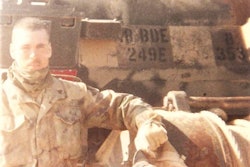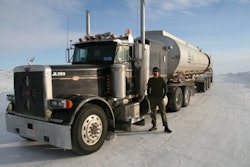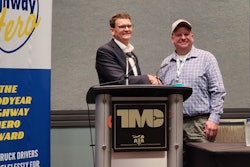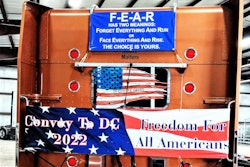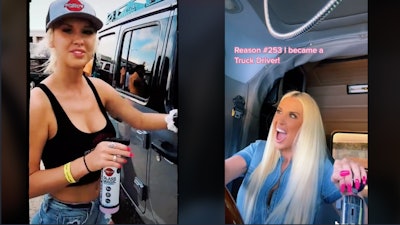
Ask yourself quickly, driver: Who is the most famous truck driver in the world right now? Tony Justice? Long Haul Paul? Joe Biden, perhaps? (Yes, that was a joke.)
Judging by a growing cadre of drivers worldwide enjoying huge social media followings, her name, in fact, is Adryana Oltean, and she's a 29-year-old Romanian with 1.5 million followers on TikTok. You can own a truck and drive it all day, read trucking media, and listen to trucking-focused radio, and still never have heard of Oltean, Alex Nino, or Asmin De Loa, despite the fact that millions watch their videos on social media every single day.
But while these online stars make videos that often depict them in and around their trucks, their appeal goes far beyond hauling freight. The most popular trucking TikTok-ers all share one important thing in common: They're mostly female and skew much younger than the average owner-operator or company driver.
Social media can be a lot of things, including a business, just like trucking, and the most famous truckers there are likely to be social media tycoons that also happen to drive a truck. But while invoking one of America's oldest and most noble careers, do these bright young stars shine a positive light on the business? A quick scan of the top videos from truck-driving social media stars shows their cameras focusing as much on their bodies or dance moves as on the work of commercial hauling.

But hey, can't a driver dance?
This three-part series takes a look at three operators with big social media followings -- and the divergent yet complementary motivations for what they do. Meet Big Rig Barbie, Matthew Marchand and, perhaps more familiar to many Overdrive readers, Desiree Wood of Real Women in Trucking.
The social media side hustle, with Big Rig Barbie
Big Rig Barbie -- a trucking personality on TikTok, with more than 300,000 followers, among other platforms -- has enjoyed the benefits of a popular social media brand and also suffered the consequences of fame, with no shortage of nasty commenters calling her a "fake truck driver," or worse. Barbie described her social media feed, which features trucking-focused videos alongside jokes, workouts and dances, as not so much trying to document the trucking industry or lifestyle, but more of "just kind of my life," she said, "where I happen to be blessed with a really badass truck," a 2001 Peterbilt 379 detailed here.
[Related: #TeamBRB's custom 2001 Peterbilt 379, DIY spirit and growing three-truck business]
But Barbie takes the social media strife in stride. She's at once active and ambitious in growing her brand, and sympathetic to drivers who don't quite see the big picture.
"I can totally understand someone that’s in their truck five months out of the year not seeing their family and saying 'she’s not a trucker, that’s so fake. I’m out here busting my ass day in, day out and nobody cares,'" she said. "But on the flipside, they don’t understand when I started my page I wasn’t really shooting for it to be a job. I was just taking pictures of my truck, and for some reason that account," on Instagram initially, "got traction."
She's not OTR, though, she fully admits, not "showering at truck stops anymore, but the fact of it is that when we were OTR, Instagram wasn't even that cool yet. So when they’re looking at it, they’re just seeing the success. They’re not seeing the climb."
Barbie said she "assumed" that much of the early interest in her social media feed was because "most people would like to see a tall blonde in front of a Peterbilt." She added that she worked hard over years on a venture she described as being like an infant that needs constant attention and nurturing, her social media business.
Social media "got to be our full time, and our full-size rig just sits in the yard," she said. "We were getting so busy, so we hired some drivers and now my husband Blake and I, it's really all social media, and we drive maybe 3 days out of the week.... Our job descriptions have shifted in the last two and a half years by a lot."
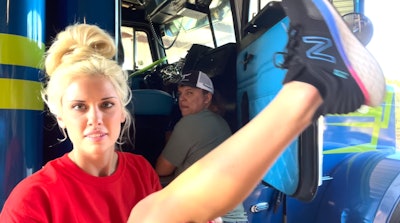 Big Rig Barbie shows off her maintenance-related prowess in a YouTube video on her channel, where she and her partner, Blake, work on their 379.Big Rig Barbie via YouTube
Big Rig Barbie shows off her maintenance-related prowess in a YouTube video on her channel, where she and her partner, Blake, work on their 379.Big Rig Barbie via YouTube
But while Barbie and Blake's work has shifted mostly to a media focus, the job remains a tough one. Even white-collar media workers face problems like burnout, and the fact that Barbie doesn't ever use her real name in media underscores the risks of becoming a famous figure where thousands of fans think they know you.
These days, she says she makes more money via social media than in trucking, where she and her partner own a small fleet that mostly hauls water to fill swimming pools locally with about five trucks and drivers. And while every operator's situation and social-media engagement level is different, opportunities to make money, or simply make a difference, abound.
Online shop Renegade Products, which sells truck polishing and detailing products, is among Barbie's sponsors. A spokesperson for the company said that being a social media influencer doesn't always require a massive following or even any obvious surface-level star power.
"If we’re working with a diesel mechanic and they only have 5,000 followers, and other people have 400,000 but nothing to do with diesel engines," the spokesperson said, then the smaller account works better for their brand as a paid influencer. The spokesman compared the strategy of working with smaller, more focused accounts to a "sniper shot" rather than the "shotgun blast" of trying to only work with bigger accounts.
Barbie prides herself on influencing a new generation to consider truck driving as a viable career path. "When I started posting it was definitely just a bunch of men truck drivers following me, but as I've grown, I'm crossing over into women truck drivers, then younger girls saying, 'That looks so fun, that looks cool, maybe I could do this,'" she said. "Just the other day, this girl turned 18 and said, 'I went to school, I got my license, thank you so much'" for being a role model.
As inspiring as Barbie may be to her followers on TikTok, the debate over what makes a good role model in trucking rages on. In the rest of this series of articles on trucking social media, we'll hear from a few more trucking celebrities on that debate.
Next in this series: Social media and trucking's 'image problem'

